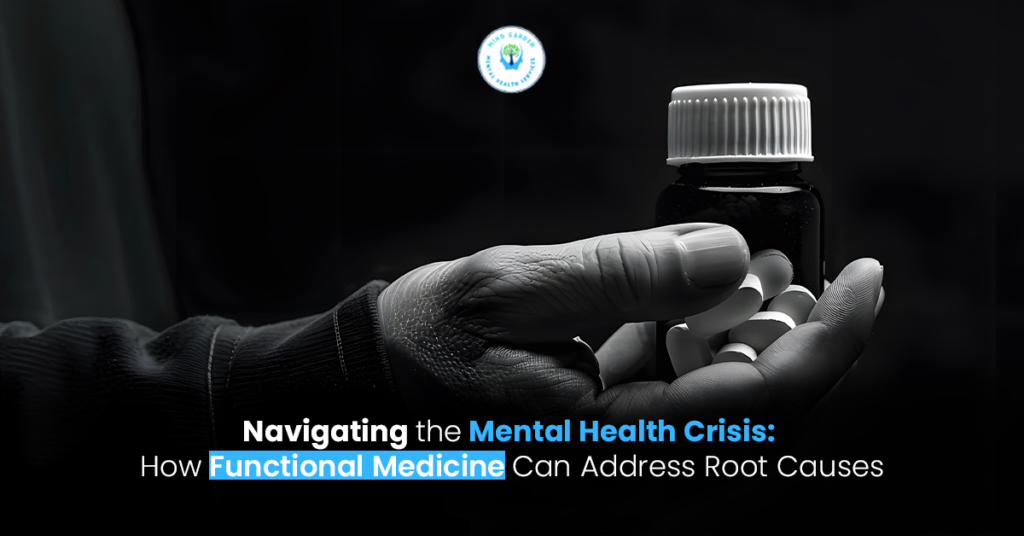
Mental health disorders, such as anxiety and depression, have become increasingly common in recent years. Many individuals are seeking alternatives to conventional treatments, as traditional approaches often focus solely on symptom management. Functional medicine, however, offers a more holistic approach by aiming to identify and treat the root causes of mental health issues. This approach considers the interplay between the gut, hormones, and nutrient levels, which together shape mental well-being. By addressing these foundational aspects, functional medicine provides a personalized strategy for improving mental health.
The Functional Medicine Approach
-
Gut Health:
The gut-brain axis has become a significant area of focus in understanding mental health. Research shows that gut dysbiosis—an imbalance in gut bacteria—can contribute to conditions such as anxiety and depression. A healthy gut helps regulate mood by producing neurotransmitters like serotonin and dopamine. Probiotics and a fiber-rich diet are often recommended to restore balance to gut flora, reducing inflammation and improving mental health. Studies have shown that individuals who incorporate probiotics into their diet experience significant reductions in anxiety symptoms [(Hyseni et al., 2023)].
-
Hormone Imbalances:
Hormones play a critical role in mood regulation. For example, low thyroid function (hypothyroidism) can lead to depression, while elevated cortisol levels, often a result of chronic stress, can contribute to anxiety. Functional medicine practitioners focus on rebalancing hormones using natural supplements and lifestyle changes, such as stress reduction techniques, to enhance mental health. Addressing these hormonal imbalances has been shown to reduce symptoms of depression and anxiety significantly [(Cyr et al., 2021)].
-
Nutrition:
Nutrient deficiencies are another key factor in mental health. Deficiencies in essential nutrients like B vitamins, magnesium, and omega-3 fatty acids have been linked to mood disorders. B vitamins support neurotransmitter function, magnesium aids in stress regulation, and omega-3s reduce inflammation in the brain. Functional medicine encourages personalized nutrition plans or supplementation to correct these deficiencies, helping alleviate symptoms of anxiety and depression. Studies have demonstrated that individuals who supplement with these nutrients show marked improvements in mood stability [(Pala et al., 2022)].
For more information on mental health and support , contact us today.
Conclusion
Functional medicine offers a comprehensive approach to mental health by focusing on gut health, hormone balance, and proper nutrition. Rather than simply masking symptoms, it seeks to heal the underlying causes of mental health disorders. For those struggling with anxiety and depression, this approach offers a promising path toward lasting relief and well-being. The future of mental health care may lie in these integrative methods, which treat the body as a whole.
References
- Hyseni, B., Hajrullahu, V., Kryeziu, B., Prekazi, L., Taganoviq, B., & Shabani, B. (2023). Impact of coping skills and mental health in burnout among healthcare professionals during pandemic COVID-19. The Open Nursing Journal.
- Cyr, S., Marcil, M., Marin, M., Tardif, J., Guay, S., Guertin, M., Rosa, C., Genest, C., Forest, J., Lavoie, P., & Labrosse, M. (2021). Factors associated with burnout, post-traumatic stress, and anxio-depressive symptoms in healthcare workers three months into the COVID-19 pandemic: An observational study. Frontiers in Psychiatry, 12, 668278.
- Pala, A. N., Chuang, J. C., Chien, A., Krauth, D., Leitner, S. A., Okoye, N., Costello, S., Rodriguez, R., Sheira, L. A., & Solomon, G. (2022). Depression, anxiety, and burnout among hospital workers during the COVID-19 pandemic: A cross-sectional study. PLOS ONE, 17(10), e0276861.
